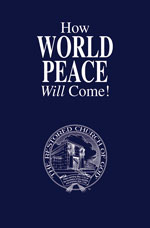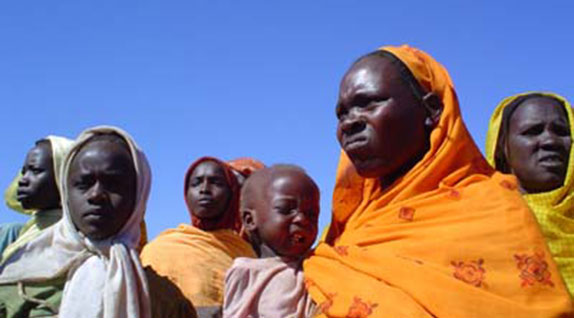 ArtToday, Inc.
ArtToday, Inc.
Article
It has been called the “worst humanitarian crisis in the world.” And it has been described as “genocide.” Will the U.S. be forced to intervene to prevent another Holocaust? How will peace finally come to Sudan?
Learn the why behind the headlines.
Subscribe to the Real Truth for FREE news and analysis.
Subscribe NowIn recent years, countries such as Iraq, Afghanistan, Bosnia and Kosovo have become familiar to television viewers around the world. And there is a horrific civil war currently taking place in one country that is not so well known-Sudan. This internal conflict has created what is widely considered to be one of the worst humanitarian crises in the world. How this crisis is handled may have implications for how the United States, European Union and United Nations resolve future crises.
To better understand the complexity of the situation raging in Sudan, we must examine the precursors to this civil war and the attempts to bring about peace. Then we will look at the REAL CAUSE of war and how peace will ultimately come-a peace that will finally lead to happiness and prosperity, not only for Sudan, but also for the whole world.
A Diverse Land
Sudan is the largest nation in Africa, and shares its borders with several nations: Egypt, Eritrea, Ethiopia, Kenya, Uganda, Congo, Central African Republic, Chad and Libya. Sudan is a diverse country comprised of large areas of deserts, rainforests, swamps, cultivatable land and mountains. Part of the vast Sahara Desert and the famous Nile River are located there.
Home to over 33 million people, Sudan is populated mainly by Muslims in the north and Christians and “animists” in the South. Sudan’s name comes from the Arabic “bilad al-Sudan,” or “land of the blacks.” However, Arabs also make up a significant portion of the population. Arabic is the official language and Islam is the official state religion, although the country has significant non-Muslim and non-Arab populations. This ethnic and religious division is key to understanding the present conflict in Sudan.
Interestingly, there are significant untapped reserves of oil in the southern part of the country. In 1978, oil was discovered in Bentiu, and in 1999, the country began exporting it. Besides oil, Sudan’s main exports are cotton, sesame and animal hides.
History of Sudan
For more than 1,000 years, Sudan was a collection of small independent kingdoms, which included the famous ancient kingdom of Nubia. The nation was closely tied to Egypt for thousands of years, but was autonomous, trading slaves, ivory and hides between Europe and Africa. In the 6th Century A.D., the Ethiopians brought traditional Christianity to the Sudanese. A century later, Arabs invaded, causing new Islamic states to emerge in Sennar (on the Blue Nile), Kordofan (to the west), and Darfur (in the western desert).
Egypt conquered the northern part of Sudan in 1820-21 and gradually expanded its control, eventually taking over the entire country in 1876. The invaders united the nation’s diverse regions and imposed foreign religious practices to its traditional “animist” beliefs-a belief structure built on the premise that spirits inhabit natural objects. The resulting religious and ethnic divisions within Sudan have played major roles in crises in its modern history.
In 1881, a religious leader named Muhammad ibn Abdalla proclaimed himself the Mahdi (the “expected one”) and led a successful revolt against the Egyptians, culminating in the fall of Khartoum (Sudan’s capital) in 1885. At that time, Sudan became an independent Islamic state. The Mahdi’s followers assumed the name “Ansars,” which they have to this day, and are associated with Sudan’s largest political party, the Umma Party.
Although the Arab north of the country supported the revolution, the Mahdist government only lasted until 1898, when British and Egyptian troops led by Lord Kitchener took control of Sudan. Britain then ruled the country until 1956, when, on January 1st of that year, the African nation received its independence.
Crisis in the Making
Shortly after Sudan gained independence, a 17-year civil war began after fighting broke out between government forces and those of the Anya Nya movement. This civil war pitted the Muslim north of the country against the Christian and animist south. Southern army officers accused the Arab-led government of going back on promises to create a federal system that would give the south a larger voice in the affairs of the country. This was a time of great instability, both politically and economically, leading to a number of changes in government as a result of military coups.
In 1972, the Addis-Ababa agreement led to a cessation of the north-south civil war, as the south was granted a degree of self-rule. This ceasefire lasted 11 years.
In 1983, the President of Sudan announced his decision to incorporate punishments drawn from Islamic Sharia law as part of a program to turn the country into a Muslim-Arab state. Southerners, along with non-Muslims in the north, were subjected to the same punishments as Muslims. For example, there were amputations for theft and public lashings for alcohol possession. As a result of these measures, protests erupted and the government imposed a state of emergency, in which most constitutionally-guaranteed rights were suspended.
This led to a rebellion in the south and a resumption of the north-south civil war involving government forces and the Sudanese People’s Liberation Movement (SPLM) led by John Garang. The civil war continues to this day, fueled by disputes over the control of oil fields and political power, allegations of injustices and discrimination perpetrated against black Africans, as well as religious conflict.
Chronic Instability
Since the resumption of its civil war, Sudan has suffered growing instability, both politically and economically. Military coups led to the overthrow of the government in 1985 and 1989. And in 1988, there were riots because of large increases in the prices of basic goods. This pattern of chronic instability continued into the 1990s.
In the 1990s, Sudan was accused of being a haven for terrorists after Osama bin Laden and his al Qaida organization moved there in 1991. For five years, bin Laden allegedly directed terrorist attacks from Sudan until he was expelled in 1996 (as a result of pressure from the U.S. and other western countries). In 1995, the UN imposed sanctions after Sudanese agents were implicated in an attempt to assassinate Egyptian President Hosni Mubarak in Addis Ababa. After years of accusing Sudan of training Muslim militants in military camps around the country, the U.S. launched a missile attack against a pharmaceutical plant in Khartoum in 1998, claiming that it was manufacturing chemical weapons. Allegations of terrorism and repression have made Sudan an international pariah.
Humanitarian Crisis
In 2001, the U.S. government sought to find a way to end the civil war and to enhance the delivery of humanitarian aid in order to relieve the suffering of the Sudanese people by appointing Senator John Danforth as Presidential Envoy for Peace in Sudan.
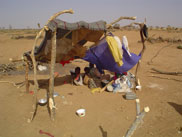 USAID
USAIDThe ongoing civil war has created a humanitarian crisis in Sudan. It has been estimated that over four million southerners have been displaced from their homes. Some have fled to other cities within the country, while others have fled to neighboring countries. These displaced people have been unable to provide for themselves and, as a result, malnutrition, starvation and disease have become widespread. In 2001, the United Nations’ World Food Program raised funds to feed three million people facing famine. The lack of educational and employment opportunities and access to basic health care services has created what international humanitarian organizations have called a “lost generation.”
The situation has deteriorated so badly that the U.S. government, in the Sudan Peace Act of 2002, accused the Sudanese government of genocide for killing more than two million civilians in the south since 1983.
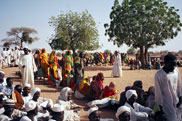 USAID
USAIDDuring this period of civil war, Sudan has also suffered repeatedly from severe drought.
Peace talks between the government and southern rebels have made only limited progress. After talks in Kenya in 2002, the government and the southern-based SPLM signed the Machakos Protocol as a first step to ending the war. Following pressure from the U.S., and European and African nations, the two warring parties then signed a historic deal in 2004 aimed at ending more than 20 years of continuous war in the south. This deal was the result of years of negotiations, and has been hailed by all parties involved as a major breakthrough in the effort to bring peace to Sudan. The parties have agreed that the south will have six years of political autonomy, after which southerners will be able to vote on a referendum on independence from Sudan. Meanwhile, southern rebels have accepted application of Islamic Sharia Law in the northern section. The two sides have also agreed to share the oil revenues from the south, which the rebels currently control.
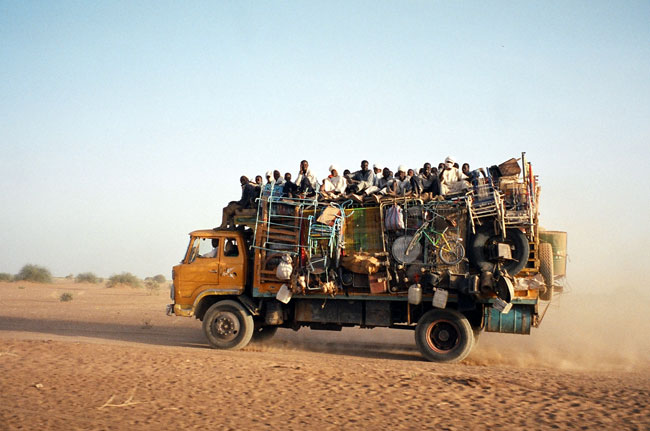 USAID
USAIDHowever, despite progress made so far, hostilities have continued in the south. Although there have been a number of attempts to end the north-south civil war, none have brought lasting peace.
The Conflict in Darfur
Even as the government and southern rebels inched closer to a peace settlement, a separate conflict erupted in early 2003 in the Darfur region in western Sudan. Fighting broke out in the arid impoverished region (with a population of six million) when rebels began attacking government targets, accusing the government of neglecting Darfur and of oppressing blacks in favor of Arabs. Motivated by the peace talks, the Darfur rebels are demanding a fairer deal for the region’s black population.
Historically, there has long been tension in Darfur over land and grazing rights between nomadic Arabs and black farmers. The farmers live and farm in the central part of the region, while the nomads live in the north and herd camels by trade. Disputes occasionally flared up between the two groups as migrating camel herders in search of water and pasture for their animals during the dry season would graze on farmers’ lands. Tribal leaders would usually settle disputes over lost crops, with the nomadic herders reimbursing the farmers. However, severe drought in the region worsened the situation, with the herders raiding farms to feed their livestock. Receiving no help from the government in spite of their protests, farmers armed themselves and fought back.
This conflict has pitted Muslim Arabs against Muslim blacks, both of whom accuse the other of atrocities. The blacks accuse the government of siding with the Arabs in the dispute, and of supporting Arab “Janjaweed” militias engaged in the ethnic cleansing of blacks in the region. In fact, refugees from Darfur have been reported as saying that following government air raids, the Janjaweed ride into villages on horses and camels and systematically kill men, rape women, and steal whatever they can find. In addition, refugee women have accused the Janjaweed of holding them as sex slaves before finally releasing them. While admitting to mobilizing “self-defense militias” following rebel attacks, the government has denied any links to the Janjaweed. Instead, the government has promised to disarm the Janjaweed. However, according to international observers, there has been little evidence of this so far.
Chronology of Recent Key Events
• 1978: Oil discovered in southern Sudan.
• 1983: Civil war breaks out in the south involving government forces and the Sudan People’s Liberation Movement (SPLM), led by John Garang.
• 1983: President Numayri declares the introduction of shari’ah (Islamic law).
• 1985: Numayri is deposed by a group of military officers.
• 1986: Coalition government formed, with Sadiq al-Mahdi as prime minister.
• 1989: National Salvation Revolution takes over in military coup.
• 1993: Revolution Command Council dissolved after Umar al-Bashir is appointed president.
• 1995: Egyptian President Mubarak accuses Sudan of being involved in an assassination attempt against him.
• 1998: The U.S. launches missile attack on a Sudanese pharmaceutical plant, alleging it was making materials for chemical weapons.
• 1998: New constitution endorsed by over 96% of voters.
• 1999: President Bashir dissolves the National Assembly and declares a state of emergency. Sudan begins to export oil.
• 2001: February - Islamist leader Hassan al-Turabi arrested a day after his party, the Popular National Congress, signed a memorandum of understanding with the southern rebel Sudan People’s Liberation Army (SPLA). March - The UN’s World Food Program struggles to raise funds to feed 3 million facing famine. April - SPLA rebels threaten to attack international oil workers brought in to exploit new oil reserves. Government troops accused of trying to drive civilians and rebels from oil fields. April-May - Police continue to arrest members of Turabi’s Popular National Congress party (PNC). June - Nairobi peace talks fail. July - Government says it accepts a Libyan/Egyptian initiative to end the civil war; Bambo oil field inaugurated in Unity State, producing 15,000 barrels per day. U.S. Senator John Danforth appointed as special envoy to help end the Sudanese conflict. November - U.S. extends unilateral sanctions against Sudan for another year, citing its record on terrorism and rights violations. December - More than 14,550 slaves-mainly blacks from the south-are set free, following campaigning by rights activists.
• 2002: January - SPLA and rival militia group Sudan People’s Defence Force pool resources in campaign against government in Khartoum. July - After talks in Kenya, government and SPLA sign Machakos Protocol on ending 19-year civil war. Government accepts right of south to seek self-determination after six-year interim period. Southern rebels accept application of Shariah law in north. President al-Bashir and SPLA leader John Garang meet face-to-face for the first time. October - Government and SPLA agree to temporary ceasefire during peace talks, yet hostilities continue. November - Negotiations stall, but both sides agree to observe ceasefire.
• 2003: April - President Bashir and John Garang meet for second time in 20 years of conflict at peace talks. October - PNC leader Turabi released after nearly three years in detention; ban on his party is lifted.
• 2004: January - Army moves to quell rebel uprising in western region of Darfur; more than 100,000 people seek refuge in neighboring Chad. March - UN official says pro-government Arab “Janjaweed” militias are carrying out systematic killings of African villagers in Darfur. May - Fighting in Darfur spills into Chad. September - UN envoy says Sudan has not met targets for disarming pro-government Darfur militias and must accept outside help to protect civilians. U.S. Secretary of State Colin Powell describes Darfur killings as genocide. Sudanese government claims it has foiled coup plot by supporters of Islamist leader Hassan al-Turabi.
Source: BBC News
The conflict in Darfur came to a head in February 2003, when two non-Arab groups, the Sudanese Liberation Army (SLA) and the Justice and Equality Movement (JEM) attacked and captured several towns. They demanded that the government disarm the Janjaweed, share power, and improve economic conditions for blacks in the region to the same standard as for Arabs. The government refused and responded by launching a major offensive in July of the same year. After months of fighting, the two sides agreed to a ceasefire in September, which was routinely violated. Eventually, by December, peace talks collapsed. According to international observers, the Janjaweed then increased attacks against civilians, creating what the UN has called “the worst humanitarian crisis in the world.” The UN has set up 147 refugee camps in Darfur and Eastern Chad to accommodate civilians who have fled their homes.
Sadly, the fighting has killed up to 50,000 people and rendered more than one million homeless, over 100,000 of whom have sought refuge in neighboring Chad. Some have fled to remote desert locations where delivering food, shelter and clothing is very difficult. Darfur’s location at the edge of the Sahara desert makes it difficult to reach, especially during the rainy season.
Many refugees have also reached camps organized by international aid agencies, but still face starvation due to delays in the arrival of foodstuffs. International aid agencies have accused the government of blocking their access to Darfur by demanding visas and using other bureaucratic obstacles. In addition, the agencies say that they do not have enough money to effectively respond to the crisis. For example, the United Nations’ Office for the Coordination of Humanitarian Affairs says that over $400 million (USD) is needed by the end of the year to respond to the most urgent needs. The situation is so serious that the U.S. Agency for International Development said recently that, without help, one million people may die, and that 300,000 will probably die no matter what is done.
The International Community’s Response
The current humanitarian crisis in Sudan has not gone unnoticed by the world’s nations. In 2004, a UN official said that the pro-government Janjaweed militias were carrying out systematic killings against African villagers in Darfur, and in September 2004, U.S. Secretary of State Colin Powell charged Sudan’s government with genocide. Recognizing the seriousness of the crisis, the UN passed a resolution in July 2004, threatening sanctions unless the Sudanese government halted atrocities by Arab militias within 30 days. However, the UN has refrained from calling the situation genocide, because, by doing so, it would be legally bound to take action to enforce the peace.
Interestingly, the 30-day period has passed and the UN has taken no action!
The United States has provided the strongest commitment to finding peace in Sudan. The focus on Sudan is part of the overall U.S. “war on terror,” with the aim being to prevent Sudan from becoming a haven for terrorist groups. In addition, the U.S. has been stung by criticism over its failure to react quickly to similar crises in Somalia and Rwanda that eventually resulted in horrific bloodbaths in those countries. Many are still haunted by the memories of genocide in Rwanda. According to the U.S. Agency for International Development, the U.S. has contributed more than $194 million in aid to Sudan. In addition, the U.S. is pushing for a greater African Union military presence in the region.
The European Union (EU) has called for sanctions against Sudan if it does not halt the conflict in Darfur. European ministers have expressed alarm at reports of atrocities coming out of Sudan, including the systematic rape of women. However, while the U.S. has called the human rights situation “genocide,” the EU has stopped short of doing this, fearing it would be legally obliged to intervene. With its large Muslim population and heavy dependence on Middle Eastern oil, Europe’s leaders are wary of militarily intervening in Islamic countries.
In July 2004, the U.S. presented a motion to the UN Security Council recommending sanctions against Sudan. However, several countries on the council, including Russia, China and Pakistan, have indicated that they oppose sanctions. In fact, Russia has continued to deliver military aircraft to the Sudanese government, with whom it has a large arms contract.
There are a number of reasons for the international community’s slow response to the crisis in Sudan. The prospect of western countries invading a largely Islamic country may be politically risky, especially in the wake of the recent controversial invasions of Iraq and Afghanistan. Then there is threat of a major terrorist backlash in the U.S. and Europe in the event of such an invasion. In addition, countries such as China and Russia have substantial business interests in the Sudan and oppose military intervention and sanctions. Finally, although Sudan is not yet a major oil exporter (producing approximately 250,000 barrels a day), countries want to avoid any sanctions that could push global oil prices higher.
Aside from the approximately 300 African Union troops and 80 peace monitors currently in Darfur, the international community has yet to seriously intervene.
Is Peace Possible?
Sudan’s civil wars have proven costly, with many Sudanese having seen a significant fall in living standards. According to the U.S. Committee of Refugees, nearly 5.5 million Sudanese had been uprooted by conflict by the end of 2003. Approximately 600,000 of them were refugees in neighboring countries. These wars have also aggravated a hunger crisis in southern Sudan, with more than 250,000 people dying from war-related famine and illnesses.
With violence currently escalating in Darfur, there is fear that the fighting may spill over into neighboring Chad, whose eastern areas have a similar ethnic makeup.
There are also other ongoing conflicts in Sudan. These include a revolt of “Beja Congress Forces” rebels in the east, and another conflict in the Shilluk kingdoms of the Upper Nile in the south. A long-running war between troops from Uganda and rebels from the “Lord’s Resistance Army,” based in lawless areas of southern Sudan, is another source of instability.
Fearing a spread of the conflict within their borders, neighboring countries have become involved in trying to find a peaceful solution to the crisis.
The world wants peace restored to Sudan, but there are challenges. Sudan is a huge land with a lack of infrastructure in many areas. Darfur alone is approximately the size of Iraq. Policing multiple conflicts in such a large territory would take more than just a few thousand troops. It is estimated that as many as 600,000 peacekeeping troops would be needed to restore order in the country. The U.S., EU and UN are already overstretched as they continue to deal with instability in geopolitical hotspots like Iraq, Afghanistan and Kosovo.
World governments have been unable to end the heart-wrenching atrocities that the Sudanese endure.
Peace Will Come
The world seeks answers to the humanitarian crisis in Sudan, but none are forthcoming.
Over the past 6,000 years, mankind has proven to be utterly incapable of preventing war. Man has tried different types of governments, alliances and leagues of nations, all to no avail. However, there is good news! Peace will come to the Sudan-and also to the entire world. But the governments and institutions of this world will not bring this about.
To understand how peace will be brought to Sudan, and to the entire world, one has to understand the CAUSE of war. Notice: “From whence come wars and fightings among you? Come they not hence, even of your lusts that war in your members? You lust, and have not: you kill, and desire to have, and cannot obtain: you fight and war, yet you have not, because you ask not” (Jms. 4:1-2).
Whether it is lust for riches, power, revenge or someone else’s possessions, men always covet what they do not have. Lust leads to hatred, which eventually results in war. In this world, people of different races and religions are frequently at odds with each other because of real or imagined injustices, or simply because they are different. As a result, men often are not willing to forgive one another when slights and offenses occur.
The key to ending war is the establishment of one world government. This is the only way war can be eliminated; this is mankind’s only hope of survival. However, none of the world’s governments can or will bring this about.
But the good news is that one world government is coming! In the not too distant future, the kingdom of God, led by Jesus Christ (the “Prince of Peace”), will be established as the government of earth (Isa. 9:6-7).
The kingdom of God will supercede all of the governments of this world (Rev. 11:15). At that time, the Law of God-the Ten Commandments-will be enforced throughout the earth. Man will learn to love his neighbor as himself (Rom. 13:9). A war-weary world will finally seek God’s Way (Isa. 2:2-4)-the way of peace.
At that time, peace will finally come to Sudan, and to the whole world! (To learn more about how war will end, please read our booklet How World Peace Will Come!)
More on Related Topics:
- In a Nigerian Village, Extremists Issued a Call to Prayer and Then Slaughtered Those Who Turned Up
- Sudanese Paramilitary Force Abducting Children in Darfur, Witnesses Say
- Nigeria’s Northeast Faces Worst Hunger in a Decade as Aid Cuts Hit Region, UN Says
- Uganda Shuts Down Internet Ahead of Election, Orders Rights Groups to Halt Work
- Sudan’s Top General Rejects U.S.-Led Ceasefire Proposal, Calling It ‘The Worst Yet’

